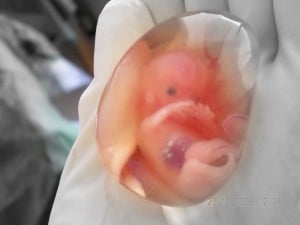Two well-known athletes are making remarkable progress following stem cell transplants from a San Diego-based biopharmaceutical company; but the company’s own statements have caused some confusion as to just where the stem cells came from.
Detroit Red Wings’ hockey great Gordie Howe and San Francisco 49ers’ retired quarterback John Brodie are showing remarkable progress after stem cell treatments with “adult stem cells,” according to Stemedica Cell Technologies president Maynard Howe.
Only there’s a problem–and it seems that Stemedica’s public statements are not simply a slip-of-the-tongue, but are instead designed to deliberately deceive the public. Thanks to the top-notch journalistic research by USA Today sports reporter Brent Schrotenboer, we learn that when Stemedica says “adult,” they really mean “adult, or child, or fetal.”
Yesterday at the National Catholic Register, I discussed the controversy regarding the labeling of stem cells as “adult stem cells” when, in fact, they were derived from the brain tissue of fetuses. Father Tad Pacholczyk, director of education for the National Catholic Bioethics Center, helped to explain when use of fetal cells might be morally acceptable.
It’s an important story–You can read the rest here.
* * * * *
One other thing, though: I want to comment publicly regarding an email I received in response to yesterday’s National Catholic Register post. The gentleman showed a command of the English language–but seemed less skilled in understanding basic precepts of moral theology. He wrote:
“Why would you drive a Yugo to work everyday when you have a Mercedes in your garage? While adult cells are useful for many applications, they are not in any way comparable to embryonic.
I find it troubling that you would rather throw these valuable embryos in the medical waste bin than use them to treat and possibly cure some of man’s worst afflictions. While you and those who seem to think they know what’s best for humanity have needlessly delayed the advance of medical science, you will not succeed. Historically, religion has tried to suppress enlightenment, trying to rely on mythology to explain away the obvious or hinder scientific progress. And how’s that workin’ out for you?
Well, where to begin?
Don’t you also find it troubling, dear reader, that anyone would take these “valuable embryos” and steal their lives, ripping them from their mothers’ wombs? Because really, that’s where the problem is: that these children, the smallest of the small, are denied the value which is intrinsically theirs because they are created by a loving God.
A while back, I wrote about the hero slave woman Sojourner Truth, who spoke out at a Women’s Convention in Akron, Ohio, in 1851. Speaking to the early feminists gathered to rally for passage of an equal rights amendment, Sojourner Truth asked, “Ain’t I a woman?” I wrote:
“Equal pay for equal work” became the mantra of the 1960s gender feminists. Gloria Steinem, Betty Friedan, Eleanor Smeal and other prominent feminists in the ‘60s and early ‘70s decried the fact that a woman was only considered “valuable” to the extent that she was wanted by a man—either her father or her husband
“No,” the feminists rightly exclaimed, “EVERY woman has an inherent dignity, regardless of her marital status.” The innate value of all women was a battle cry for the women’s movement at its offset. How ironic, then—how unthinkable—that only a few years later they should abandon that line of reasoning for the convenience of the “women’s rights” movement, hitching their wagon to “a woman’s right to choose.”
For just as a woman is invaluable because she has been created by God, so, too, is the unborn child—the fetus or, before that, the embryo—precious, because God has crafted it in His likeness, has imbued it with life, has granted it a dignity which remains, regardless whether or not it was “chosen” and is desired by its mother.
It is toward that horror–the killing of thousands of innocent children in their mothers’ wombs in contemporary America–that you should focus your anger.
When we read that Ilse Koch, the so-called “Bitch of Buchenwald,” had lampshades fashioned from the skin of Jews who died in the concentration camps, should we be glad that this resource was put to good use, rather than being burned in the furnace? No, we are horrified, because we know that this evil had overtaken the land, imprisoning and butchering men and women because they were not valued in the society where they lived and worked.
If we lack the capacity to recognize this new horror–namely, the dismembering of growing infants in the womb, or sucking their brains out with vacuum aspirators–as even more terrible because the children are so innocent and so dependent on their mothers, then instrumentalism has consumed our hearts, and we as a society have fallen lower than the Nazis.
* * * * *
![Jonathan Swift, by Charles Jervas [Public domain or Public domain], via Wikimedia Commons](https://wp-media.patheos.com/blogs/sites/148/2015/06/Jonathan-Swift.jpg)
Charles Jervas [Public domain or Public domain], via Wikimedia Commons
In 1729, Irish writer Jonathan Swift published a straight-faced satire called A Modest Proposal for Preventing the Children of Poor People From Being a Burden to Their Parents or Country, and for Making Them Beneficial to the Publick.
More commonly known by its abbreviated title, A Modest Proposal made the case that the poor in Ireland could kill two birds with one stone, as it were–reducing the number of mouths to feed, and enjoying a hearty repast–by eating their children. Swift wrote, famously:
I have been assured by a very knowing American of my acquaintance in London, that a young healthy Child well Nursed is at a year Old, a most delicious, nourishing, and wholesome Food, whether Stewed, Roasted, Baked, or Boyled, and I make no doubt that it will equally serve in a Fricasie, or Ragout.
Swift, in the bold satire, intended to shock people into realizing the plight of the poor.
He cited the Catholics (“Papists”, he called them) who had, according to his tongue-in-cheek prose, conceived more children during Lent because of the nutritional value of fish:
Infant’s flesh will be in Season throughout the Year, but more plentiful in March, and a little before and after; for we are told by a grave Author an eminent French physitian, that Fish being a prolifick Dyet, there are more Children born in Roman Catholick Countries about nine Months after Lent, than at any other Season, therefore reckoning a Year after Lent, the Markets will be more glutted than usual, because the Number of Popish Infants, is at least three to one in this Kingdom, and therefore it will have one other Collateral advantage by lessening the Number of Papists among us.
Swift insisted, at the end, that he had no personal stake in the discussion, but merely wanted to help others. “I Profess in the sincerity of my Heart,” he wrote,
“…that I have not the least personal Interest in endeavouring to promote this necessary Work having no other Motive than the publick Good of my Country, by advancing our Trade, providing for Infants, relieving the Poor, and giving some Pleasure to the Rich. I have no Children, by which I can propose to get a single Penny; the youngest being nine Years old, and my Wife past Child-bearing.
So in the tradition of Swift, my challenge to you, dear reader, is to find ways to cannibalize the blood-rich corpses of infants and pre-born children. You know: Better Living Through Chemistry.
And your deliberate disregard for the well reasoned cosmology and human values imparted by religion (“mythology”, as you call it), simply brushing them away with a wave of your hand: How’s that workin’ out for you?
















